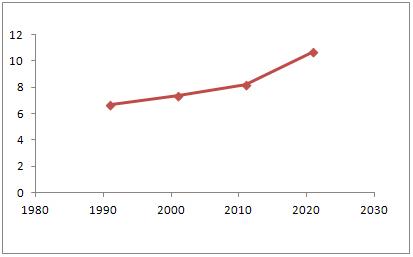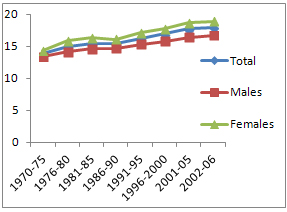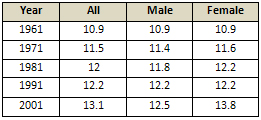|
Abstract
Objectives:
This working paper is a modest attempt to
associate Lifelong Learning process with geriatric
care i.e. the physical and mental well-being of
the elderly people of India.
Methods and Materials: The present study
utilised data from Census of India, National Sample
Survey Organisation and Sample registration system
for reviewing the relevant issues like who are
the old, what are their problems and why do they
need care or why society should at all bother
for their care?
Results: The present study humbly proposes
the introduction of folk games or traditional
games for identifying psychological / psychiatric
disorders of elderly people. Another fruitful
learning experience may be the learning of a new
language in a later age. The post retirement period
may be the fertile ground for hobby and experience
sharing. All these proposed schemes of learning
for aged people demand an infrastructure. This
is the responsibility of the government and society
as a whole.
Conclusion: This study does not demand
credit for any innovative schemes of learning.
The present study only proposes a few new contexts
for these processes. It is sincerely expected
that the use of Lifelong Learning as a medium
for the physical and mental upliftment of this
esteemed section of the society would give the
'concept of learning' it's much needed humanistic
approach.
Key words: lifelong learning, geriatric
care, humanistic approach.
|
- - - - - - - - - - - - - - - - - - -
- - - - - - - - - - - - - - - - - - - - - - - -
Introduction
Lifelong Learning is a process where one can participate
in the learning process throughout ones' whole life
which implies that it is never too soon or too late
to learn. One should always be open to new ideas and
learning. So it can be summarised that Lifelong Learning
is a practice which starts even before schooling and
never ever stops (even after the accomplishment of formal
education).
The notion of Lifelong Learning evolved in the early
twentieth century, particularly after the First World
War and gained worldwide popularity in the mid 90's
just after international bodies like UNESCO began to
popularise the idea. Actually, the idea of Lifelong
Learning germinated in a government report of Britain
published in 1919 which expressed that adult education...is
a permanent national necessity...and therefore should
be both universal and lifelong. (1)
The urge for an all embracing education system can be
understood in the context of the post World War scenario
when the whole of Europe was handicapped by the atrocities
of the War. The situation became graver after the Second
World War. There was an increasing demand for skilled
labour force for the purpose of post war reconstruction
and as the conventional education system proved inadequate
to produce as much skilful workers, hence there surfaced
the demand of an alternative education to cope with
the situation. The concept of lifelong learning became
an international agenda with the active participation
of world bodies like UNESCO, European Union (EU), Organization
for Economic Cooperation and Development (OECD) and
many others. While, as an intellectual body UNESCO's
primary concern was to achieve all around development
through learning and to pay as much heed to human development
as to purely material progress (2
), the focus of organizations like EU and OECD
remained static with the notion of growth, competitiveness
and employment.(3) It is
seen that in a changing world UNESCO's slogan of learning
to be has been overrode by the more alluring 'economistic'
paradigm of knowledge economy.
The foregoing discussion leads us to the conclusion
that the concept of Lifelong Learning emerged as an
aide of the contemporary perception of 'knowledge economy'
and thus facilitating learning as a tool to create a
highly skilled and a adaptable workforce for the global
market economy. Thus Lifelong Learning, from its very
inception was imbibed with an economic undertone. Recently
attempts are being made to free this idea from the stigma
of being a hand maid of the global economy. In this
attempt some scholars try to give Lifelong Learning
process a pedagogic sugar-coat.
The present study, however, will not try to justify
or to explain either of these explanations. On the other
hand, it attempts to suggest another approach for lifelong
learning process, which is more humanistic in its essence.
The proposed approach would link Lifelong Learning with
geriatric care which means the wellbeing of the aged
people, a very significant section of Indian society.
Methods and Materials
Before moving towards the main context of this study
i.e. linking up lifelong learning with geriatric care,
let us have a brief look into the relevant issues like,
who are the old, what are their problems and why do
they need care or why society should at all bother for
their care?
Old age or ageing is an inevitable component of all
living beings. It is a reflection of physical, psychological
and social change. The definition of old age is not
rigid since the meaning of old age varies among the
different people of the world. In some societies people
are considered old due to alteration in their social
position and restricted regenerative capability as compared
to other adults. According to the Government of India's
definition on old age, adopted in 'National Policy on
Older Persons' (1999), an 'elderly' or a 'senior citizen'
is a person who is 60 years of age or above. (4)
Although 60 years is a too young age to be old, here
in this study, we shall take the Government of India's
yardstick to gauge the age of the old people of this
country.
Major increase in life expectancy and a host of other
reasons brings a rapid demographic transition in India
since the last quarter of the preceding century. This
demographic change specifically highlights the massive
increase in older population and ageing people, which
in turn, poses to be a grave concern for the health
planners of India. The following figures will show the
increasing scenario of the senior citizens of India
across the years.
Figure: 1 Percentage of 60+ aged population of India,
1991-2021

Source: Census of India, 1991,2001,2011,2021*(*projection)
Figure: 2 Percentage of population
aged 60 and above to general population by sex, India,
1901-2001

Source: Sharma, S.P. & Peter Xenos. 'Ageing in India:
Demographic background and analysis based on census
materials' Occasional paper No. 2 of 1992, Office of
the Registrar General and Census Commissioner, India,
New Delhi, 1992
Figure: 3 Expectation
of life at age 60 and 70+ by sex over time of India


Source: Sample Registration System (SRS) Office of the
Registrar General, India.
Figure 4: Old age dependency ratio by sex for India,
1961-2001

Source: Office of the Registrar General, India
Figure 5: Per 1000 Distribution
of aged persons living alone for each sex and residence,
India

Source: NSS 52nd round (1995-96), NSS 60th round (2004-05).
The above figures clearly indicate the steady growth
of the elderly people in recent years. If demographic
projections are to be believed, the proportion of elderly
people would increase into an insurmountable amount
amount up to 360 per cent by 2050.(5)
Therefore, it is high time to sensitively chalk out
adequate and effective strategies to address the physical
and mental wellbeing of this sizeable section of the
society.
Normally in our country, people retire from active working
life between the age group of 60-65. At this age a man
usually finds himself in a sufficiently healthy and
active position. However, as a result of rise of expectancy
of life over the years, a person generally lives for
another 20 to 25 years even after his retirement from
formal and informal working life. At this age group,
a man suddenly discovers that the periphery of his activity
has been rapidly shrinking with his growing age. This
discovery brings a negative sense of emptiness and void
to the mind of the concerned person which consequently
paves the way for numerous mental and physical ailments.
At this critical juncture persons need care and support
from the immediate family, society and government.
Unfortunately care for the aged is not yet been in the
priority list of the health policies of this country.
Further, the enormity of the situation confirms that
it is not only the responsibility of the government
and other stakeholders, but society as a whole should
come forward to tackle this issue with care and consideration.
In this regard, this study attempts to explore the various
avenues of using Lifelong Learning as a tool for geriatric
care.
Results and Discussion
Because of its much needed flexible format, the process
of lifelong learning is the best alternative for geriatric
care. Learning is a lifelong exercise and new learning
experiences in a later phase of life may provide newer
meaning of life to the senior members of our society.
In this context, the present study humbly proposes the
following avenues of learning which may positively affect
the mental and physical wellbeing of the elderly people.
It is a fact that games, particularly folk games, carry
with them a psychological significance of practical
application. (6) Thus these
games are evidently therapeutic in stress-management
and can also be utilized as a diagnostic tool in identifying
psychological / psychiatric disorders. Some of these
games can be used as remedial tools for senior citizens
of our society.
As a result of invention of modern medicines and for
many other reasons there has been a considerable increase
in the life expectancy of the people, but unfortunately
this longevity does not tally with health expectancy.
In other words, people now-a-days are living a longer
life than their predecessors but are prone to various
ailments - both mental and physical. Subsequently, the
society is experiencing an increase in the population
of senior citizens. These people, now in their old age,
are sometimes confronted with the feeling of isolation
and neglect from their own family members.
It is seen that traditional games, particularly, board
games, are likely to be useful for the elderly people.
Traditional games are associated with the roots of one's
culture and learning these games will give the elderly
people the pleasure of rediscovering their childhood
and will preoccupy them in some leisurely activities.
The involvement in these games would also increase their
physical dynamism.
Board games can be beneficial to these people as they
assist the participants with regular mental exercise
which will effectively help them to prevent or minimize
mental diseases like insomnia, depression, Alzheimer's
disease etc. Medical reports say that the risk of dreaded
Alzheimer's disease can be minimized by involving in
regular mental exercise like playing board games.(7)
The senior members of the family can play these games
with their grand-children and such involvement in traditional
activities may resurrect the family ties which are otherwise
on the wane.
Another fruitful learning experience may be the learning
a new language in a later age. Language learning at
any age can unlock new avenues. It is proved to be very
beneficial to the elderly learners too. Research shows
that mature learners have more advantage in mastering
new language as they can cast aside the hassles of everyday
life and devote more time in study than their younger
counterparts. Further, the informal approach of this
new learning process gives the mature students respite
from the stress and anxiety usually associated with
formal education's examination and evaluation process.
Learning a second language has immense cognitive benefits.
Frequent learning and review of a new language s invigorates
the brain to react faster. A 2012 article in the UK's
"Telegraph" suggests that studying a second
language "rewires" the brain, and could help
delay the onset of dementia for years.(8)
To be precise, it is purely a refreshing learning experience
which may provide the senior learners with much needed
self-confidence and help them to come out of negativity.
In the prime time of life people have had many dreams
and desires most of which have remained unfulfilled.
One might have been a promising poet, artist, actor
or a violin player in his/her youth. But the busy schedule
of his/her professional life hardly spared any time
for participation in these hobbies. The post retirement
period may be the fertile ground for satisfying such
long cherished desires. Similarly hobby and experience
sharing may be a very constructive way of passing time.
The senior members of the society are the live treasure
house of varied experiences. By sharing their firsthand
experiences with the listeners (or learners) of heterogeneous
age they can impart their contemporary knowledge to
the generation next and make society enriched.
All these proposed schemes of learning for the aged
people demands an infrastructure. These people at least
need a premise where they can sit and learn and play
one or two new games, practise newly learned language
and share hobbies and experiences with others. Here
comes the responsibility of the government and society
as a whole. Government should construct halls in the
model of community centres where all necessary amenities
for elderly people should be readily available. There
should be provision for staff like caretakers instructors
etc. Another plausible alternative may be the educational
institutions like schools and colleges which may easily
arrange such community hall for the elders as they have
the necessary infrastructure. Funding should not be
a very big issue as the University Grants Commission
and other funding agencies would not object in funding
such extension activities. The urgent need at this moment
is a responsible, compassionate and humanistic approach
towards the elderly members of our society.
Conclusion
This study does not demand credit for any innovative
schemes of learning. All the aforementioned schemes
already exist. The present study only proposes a few
new contexts for these processes. It is sincerely expected
that the use of Lifelong Learning as a medium for the
physical and mental uplifting of this esteemed section
of the society would give the 'concept of learning'
it's much needed humanistic approach.
........................................................................................................................................................
1. As cited by Vijita Singh Aggarwal:
Lifelong Learning: The Challenge in Context of India,
published in RJSSM: Volume: 01, Number: 10, Feb-2012.
2. ibid
3. Tuckett, A (1997) Lifelong Learning in England and
Wales: An Overview and guide to issues arising from
the European Year of Lifelong Learning, Leicester, UK:
NIACE
4. Situation Analysis of the Elderly
in India, published by Central Statistics Office, Ministry
of Statistics & Programme Implementation, Government
of India, June2011, p-iii
5. A report by the United Nations
Population Fund, 2011
6. Pradyumna Sarma, Traditional Games of Assam, unpublished
doctoral thesis, p-171
7. Y. Stern, Cognitive
reserve and Alzheimer disease. In Alzheimer Disease
and Associated Disorders Vol. 20 (2), July, 2006, pp-
112-117.
8. As cited in Learning a Language at a Later Age, http://www.pimsleurapproach.com,
retrieved on 12.8.2013
References
1. Aggarwal, V.J.: Lifelong Learning: The Challenge
in Context of India, RJSSM: Volume: 01, Number: 10,
Feb-2012.
2. Ahmed, M.: Lifelong Learning and the Learning Society,
published in Institutionalising Lifelong Learning Creating
conducive environments for adult learning in the Asian
context edited by Madhu Singh, UNESCO Institute For
Education, Hamburg, 2002.
3. Prakash, I.J.: Ageing In India, Document prepared
for World Health Organization, Geneva, 1999.
4. Tuckett, A. Lifelong Learning in England and Wales:
An Overview and guide to issues arising from the European
Year of Lifelong Learning, Leicester, UK, NIACE, 1997.
5. Situation Analysis of the Elderly in India, published
by Central Statistics Office, Ministry of Statistics
& Programme Implementation, Government of India,
June 2011.
6. Census of India, 1991, 2001, 2011 Registrar General
of India, Govt. Of India, New Delhi.
7. Sharma, S.P. & Peter Xenos, Ageing in India:
Demographic background and analysis based on census
materials, Occasional paper No. 2 of 1992, Office of
the Registrar General and Census Commissioner, India,
New Delhi, 1992
8. Registrar General of India, (1970-75, 1976-80, 1981-85,
1986-90, 1991-95, 1996-2000, 2001-05). Sample Registration
System, New Delhi, India.
9. NSS 52nd Round (1995-1996), Report No. 439. New Delhi:
National Sample Survey Organisation, Ministry of Statistics
and Programme Implementation.
10. NSS 60th round (2004-05), Report No. 504. New Delhi:
National Sample Survey Organisation, Ministry of Statistics
and Programme Implementation
11. Sarma, Pradyumna Traditional Games of Assam, unpublished
doctoral thesis, 2011.
12. Stern, Y. Cognitive reserve and Alzheimer disease
published in Alzheimer Disease and Associated Disorders,
Vol. 20 (2), July, 2006, pp- 112-117.
|

